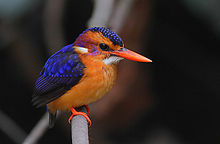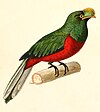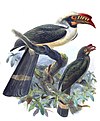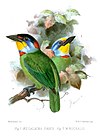Ispidina
Appearance
| Ispidina | |
|---|---|

| |
| African pygmy kingfisher (Ispidina picta) | |

| |
| African dwarf kingfisher (Ispidina lecontei) | |
| Scientific classification | |
| Domain: | Eukaryota |
| Kingdom: | Animalia |
| Phylum: | Chordata |
| Class: | Aves |
| Order: | Coraciiformes |
| Family: | Alcedinidae |
| Subfamily: | Alcedininae |
| Genus: | Ispidina Kaup, 1848 |
| Type species | |
| Todus pictus[1] Boddaert, 1783
| |
| Species | |
|
see text | |

| |
| African pygmy kingfisher range
Extant (resident)
Extant (breeding)
| |

| |
| African dwarf kingfisher range | |
Ispidina is a genus of small insectivorous African river kingfishers.
The genus was introduced by the German naturalist Johann Jakob Kaup in 1848 with the African pygmy kingfisher (Ispidina picta) as the type species.[2][3] The genus is the sister group to the genus Corythornis containing four small African kingfishers.[4]
Species
[edit]The two species in the genus are:[5]
| Common name | Scientific name and subspecies | Range | Size and ecology | IUCN status and estimated population |
|---|---|---|---|---|
| African pygmy kingfisher | Ispidina picta (Boddaert, 1783) |
Africa south of the Sahara | Size: Habitat: Diet: |
LC
|
| African dwarf kingfisher | Ispidina lecontei Cassin, 1856 |
Angola, Cameroon, Central African Republic, Republic of the Congo, Democratic Republic of the Congo, Ivory Coast, Equatorial Guinea, Gabon, Ghana, Guinea, Liberia, Nigeria, Sierra Leone, South Sudan, and Uganda.
|
Size: Habitat: Diet: |
LC
|
These similar small kingfishers can be distinguished by the blue crown of the African pigmy kingfisher. They have different habit preferences and have mostly non-overlapping ranges. The slightly smaller African dwarf kingfisher occurs in tropical rainforests while the African pygmy kingfisher occurs in dry grassy woodland.[6]
References
[edit]Wikimedia Commons has media related to Ispidina.
- ^ "Alcedinidae". aviansystematics.org. The Trust for Avian Systematics. Retrieved 2023-07-25.
- ^ Kaup, Johann Jakob (1848). "Die Familie der Eisvögel (Alcedidae)". Verhandlungen des Naturhistorischen Vereins für das Großherzogthum Hessen und Umgebung (in German). 2: 71–72. OCLC 183221382.
- ^ Peters, James Lee, ed. (1945). Check-list of Birds of the World. Volume 5. Cambridge, Massachusetts: Harvard University Press. p. 177.
- ^ Andersen, M.J.; McCullough, J.M.; Mauck III, W.M.; Smith, B.T.; Moyle, R.G. (2017). "A phylogeny of kingfishers reveals an Indomalayan origin and elevated rates of diversification on oceanic islands". Journal of Biogeography. 44 (2): 269–281. doi:10.1111/jbi.13139. S2CID 90416559.
- ^ Gill, Frank; Donsker, David, eds. (2016). "Rollers, ground rollers & kingfishers". World Bird List Version 6.3. International Ornithologists' Union. Retrieved 25 September 2016.
- ^ Fry, C. Hilary; Fry, Kathie; Harris, Alan (1992). Kingfishers, Bee-eaters, and Rollers. London: Christopher Helm. pp. 195–198. ISBN 978-0-7136-8028-7.










